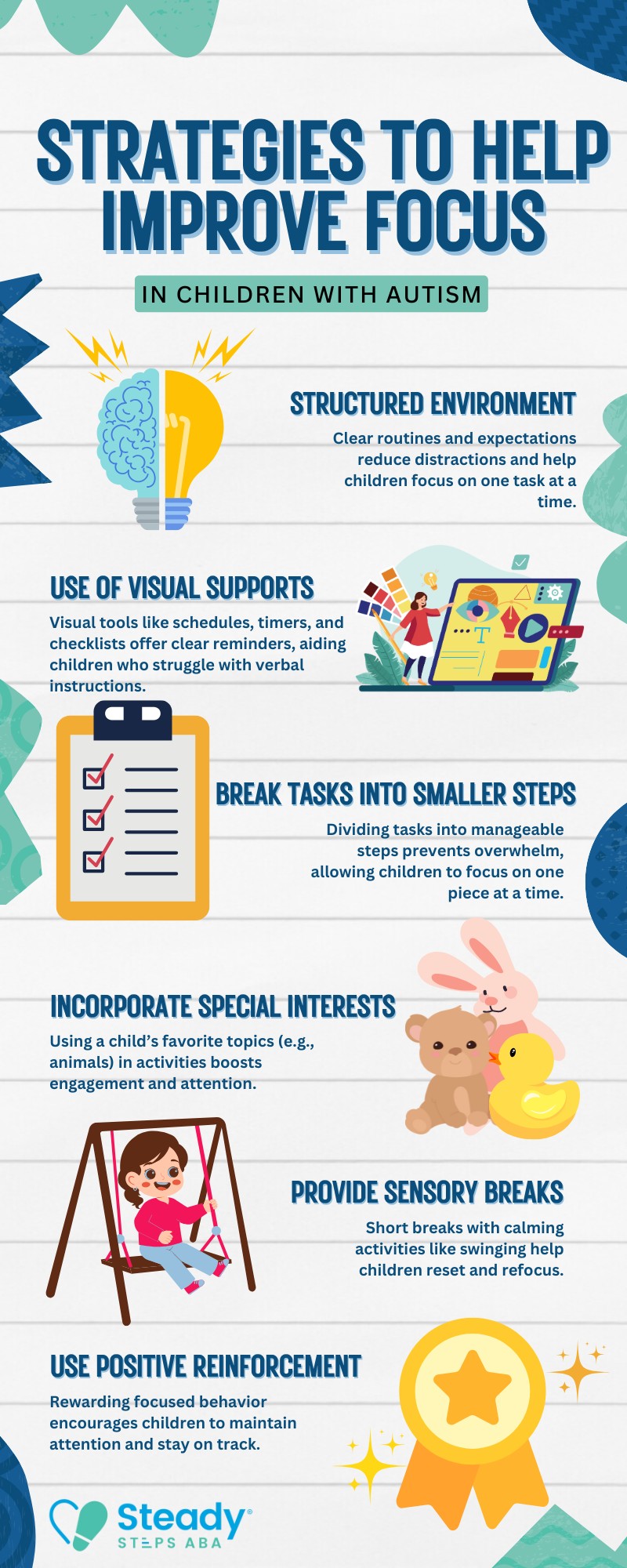Key Points:
- Autism can cause significant challenges in attention and focus, often leading to difficulties in tasks requiring sustained concentration.
- Children with autism may experience sensory overload, causing distractions and making it harder to stay focused.
- Strategies like Applied Behavior Analysis (ABA) therapy can be effective in improving attention and focus in children with autism.
One of the key challenges faced by many children with autism spectrum disorder (ASD) is autism trouble focusing, which can impact their ability to complete tasks, follow instructions, or participate in social interactions. In this article, we’ll explore how autism impacts focus and attention and what strategies can help improve these areas.

How Does Autism Affect Focus and Attention?
Autism trouble focusing often stems from a combination of neurological and sensory processing differences. Children with autism may have a harder time filtering out distractions, which can make it difficult for them to maintain sustained attention. But what does this mean in practice? Here’s a closer look at how autism impacts focus and attention:
- Sensory Sensitivities
Many children with autism are sensitive to sensory input, such as bright lights, loud sounds, or even the texture of clothing. These sensory sensitivities can cause them to become easily overwhelmed, making it harder to focus on the task at hand. For example, a child trying to complete homework in a noisy room might struggle to concentrate due to sensory overload. - Difficulty with Task Initiation and Completion
Children with autism may have difficulty starting or finishing tasks, particularly if the task requires prolonged focus. This can manifest in both academic settings (like staying on task during a lesson) and at home (like completing chores). The child’s attention span may be shorter than their peers, and the effort to maintain focus can feel exhausting. - Restricted Interests
One characteristic of autism is having an intense interest in specific topics. While these deep interests can be beneficial in some areas, they can also make it difficult for children to shift their attention away from their preferred activities. For instance, a child with an interest in trains might become so focused on trains that they ignore other activities, like schoolwork or social interactions.
Although autism trouble focusing can be challenging, there are several strategies that can help children stay on task and improve their attention span. These strategies can be implemented at home, school, or in therapy settings:

How Does ABA Therapy Help with Focus and Attention in Autism?
Applied Behavior Analysis (ABA) therapy is one of the most effective therapies for addressing autism trouble focusing. ABA therapy focuses on teaching and reinforcing desirable behaviors while reducing unwanted behaviors. The therapy is highly individualized, making it possible to address a child’s unique needs in relation to focus and attention.
ABA therapy uses several techniques to help children improve their attention:
- Task Analysis
ABA therapists break tasks into smaller, manageable parts and teach them step-by-step. This makes it easier for children to focus on one part of the task at a time. - Reinforcement Systems
Positive reinforcement in ABA helps children with autism stay motivated and on-task. By rewarding focused behavior, children learn that maintaining attention leads to positive outcomes. - Prompting and Redirection
ABA therapists use prompts and redirection to guide children’s attention back to tasks when they become distracted. These prompts are gradually faded over time to encourage independent attention. - Behavioral Shaping
ABA therapists can use behavioral shaping to gradually increase the amount of time a child can focus on a task. This gradual progression helps build attention span in a manageable and achievable way.
Partner with Steady Steps ABA for Support
Autism trouble focusing can be one of the more challenging aspects of autism, but with the right support and strategies, children can improve their attention and focus over time. ABA therapy offers a structured, individualized approach to help children develop focus skills in a way that works for them.
If you are looking for ABA therapy services that can support your child with improving focus and attention, Steady Steps ABA is here to help. Our dedicated team of professionals works with children and families to create personalized treatment plans that address individual needs and promote long-term success.
Contact us today to learn how our ABA therapy programs in Maryland can help your child build the focus and attention they need to thrive!






